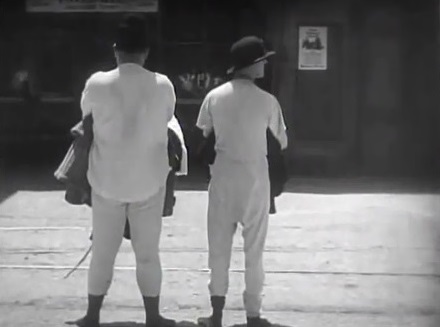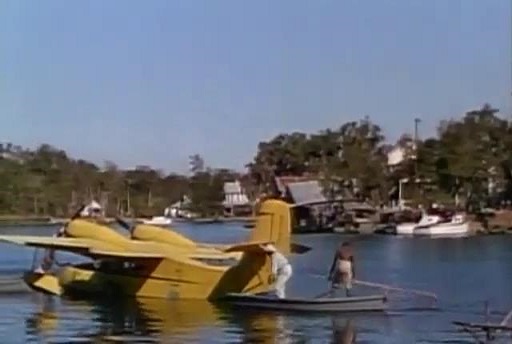Unaccustomed as we are—
A fable of
married life, bringing home the lesson, as it were, promulgated in Should Married Men Go Home? (dir. James
Parrott).
Hardy brings
Laurel home to dinner, Mrs. Hardy calls it quits. Catastrophes in the kitchen are
addressed by Mrs. Kennedy from across the hall, she loses her dress. Mr.
Kennedy (a cop) assists at his own cuckolding, boasts of his philandering in
his wife’s earshot. She lowers the boom on him,
he lowers the boom on Hardy, while Laurel jauntily tumbles down the stairs and
away.
Double Whoopee
Gag clusters
around Stroheim’s Foolish Wives and Murnau’s Der letzte Mann end
in the hotel lobby full of eye-poking and food-tossing, after which the new
footman and doorman (Laurel and Hardy) move on.
Berth Marks

“A big time
vaudeville act” in three syllables, en
route to the outer hell of Pottsville.
The damnation of Mercier
and Camier...
Men O’ War
A
sunny day at the park. Two girls and a couple of sailors (Stan, Ollie).
A cop returns one
girl’s white gloves, the tars have a pair of knickers in hand.
The soda fountain
is a tight proposition, Stan wins at the slot machine.
A naumachia on the lake ends with everyone in it.
Angora Love
Later on this is Laughing
Gravy (dir. James W. Horne),
a magnificent work, but here it positively reeks of genius and is named
Penelope, it follows them to their apartment hotel and gets the angry landlord
arrested for stealing it.
Crosswinds

Perspective on the war, poetically expressed as a
function of the French title, say, from the novel, L’Or de la Nouvelle-Guinée. One is neutral
with a certain grudge, one has sworn off for Sir David’s sake. The
company ships gold bullion by air, there’s a likely lake for sinking the
stuff and retrieving it with divers. “Une incroyable aventure dans l’île la
plus mystérieuse du monde, refuge des derniers cannibales.”
Dexter Haven and the boat that is “yare”
have a part to play on the other side of the world (The Philadelphia Story, dir. George Cukor). Huston has the theme
quite vividly in Key Largo and Beat the Devil. Hawks’ To Have and Have Not has skipper and
lone crewman, leading directly to The Gun
Runners (dir. Don Siegel) for the pirated boat “at public
auction” (cp. They Dare Not Love,
dir. James Whale). Then there are Mowbray and Abbott
as Gutmann and Allnutt, to
swell the scene (in this connection it is well to note the Governor’s
aide Sir David, a likeness of Nigel Bruce amounting to an impression of the
actor).
“You was, er, speakin’
about money, me Lord, an’ referrin’ to my
stupidity. Bowin’ to ‘arrow and Oxford,
may I make so bold as to enquire—“
“You’re drunk, but I’ll do my best
to enlighten you.”
Cynicism to the point of schrecklichkeit, elements of a
composition remembered by Fuller in his diving masterpiece manqué Shark! (his
title is Caine), where the descending
net becomes bits of shark bait. Welcome
to Arrow Beach (dir. Laurence Harvey) recalls the metaphor.
“On s’évade à nouveau, Mrs.
Singleton?" (but this is “there
goes the world, Mrs. Singleton”).
Screenplay by the director,
cinematography (Technicolor) Loyal Griggs, etc.
Bosley Crowther of the New York Times, “shouldn’t happen to
a dog.” TV Guide, “a fun
picture but as memorable as last July 22nd's weather report.” Halliwell’s Film Guide,
“good value for money as the lower half of a double bill.”